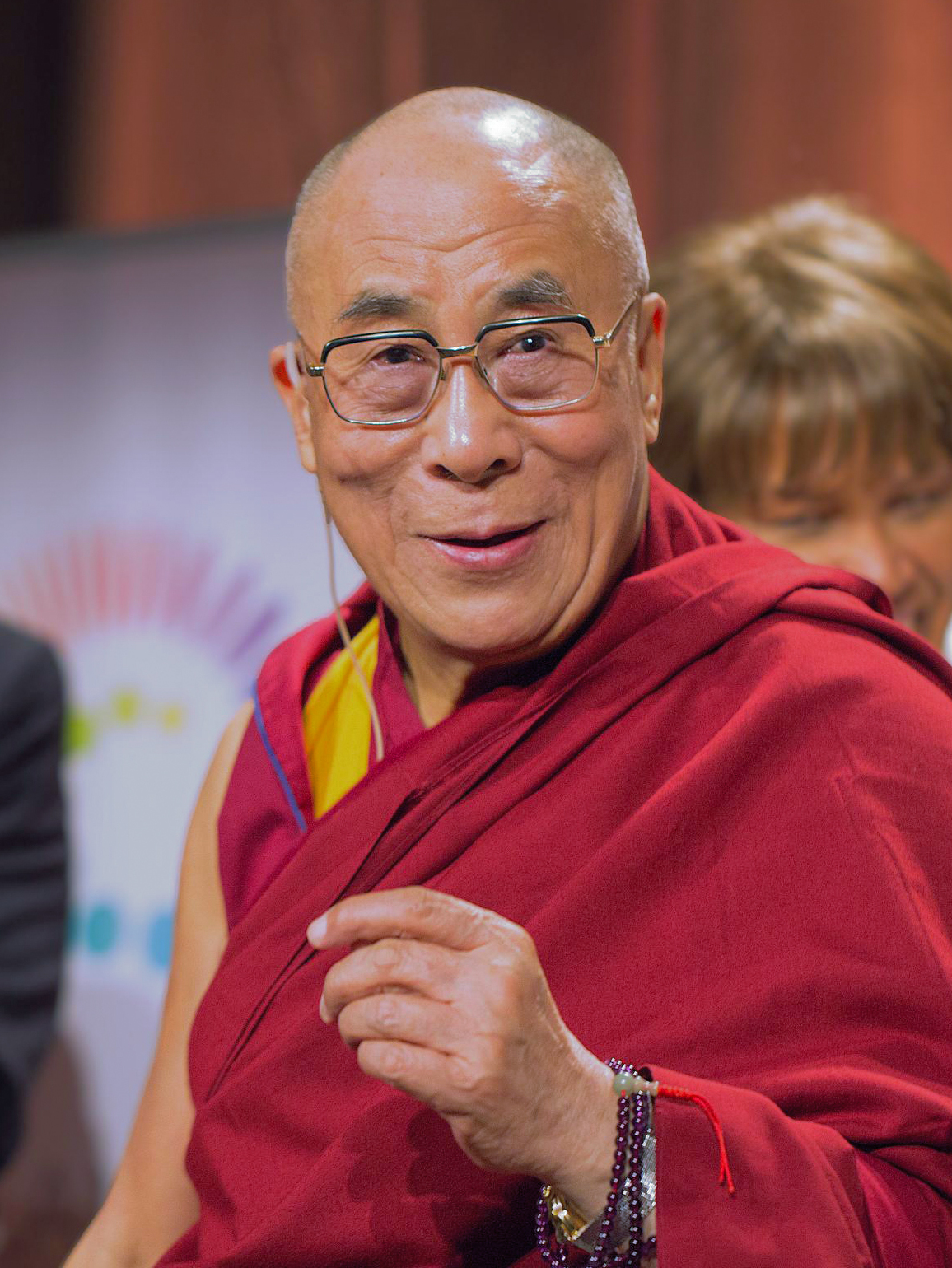“Dr. Rajendra Prasad was a true Bodhisatva. His humility brought tears to my eyes.”
Freedom in Exile: The Autobiography of the Dalai Lama (1991).
The 14th Dalai Lama is the current Dalai Lama. Dalai Lamas are important monks of the Gelug school, the newest school of Tibetan Buddhism which was formally headed by the Ganden Tripas. From the time of the 5th Dalai Lama to 1959, the central government of Tibet, the Ganden Phodrang, invested the position of Dalai Lama with temporal duties.
The 14th Dalai Lama was born in Taktser village, Amdo, Tibet and was selected as the tulku of the 13th Dalai Lama in 1937 and formally recognized as the 14th Dalai Lama at a public declaration near the town of Bumchen in 1939. His enthronement ceremony as the Dalai Lama was held in Lhasa on 22 February 1940, and he eventually assumed full temporal duties on 17 November 1950, at the age of 15, after the People's Republic of China's incorporation of Tibet. The Gelug school's government administered an area roughly corresponding to the Tibet Autonomous Region just as the nascent PRC wished to assert control over it.
During the 1959 Tibetan uprising, the Dalai Lama fled to India, where he currently lives as a refugee. The 14th Dalai Lama received the Nobel Peace Prize in 1989. He has traveled the world and has spoken about the welfare of Tibetans, environment, economics, women's rights, non-violence, interfaith dialogue, physics, astronomy, Buddhism and science, cognitive neuroscience, reproductive health, and sexuality, along with various topics of Mahayana and Vajrayana Buddhist teachings.

“Dr. Rajendra Prasad was a true Bodhisatva. His humility brought tears to my eyes.”
Freedom in Exile: The Autobiography of the Dalai Lama (1991).
News conference in Vancouver, B.C. as quoted in The Globe and Mail. (8 September 2006).
"I am a simple Buddhist monk: Dalai Lama" in The Times of India (6 July 2006) http://timesofindia.indiatimes.com/articleshow/1711921.cms.
"Kindness and Compassion" p. 47.
The Dalai Lama: A Policy of Kindness (1990)
“I am a simple Buddhist monk — no more, no less.”
As quoted in Nobel Prize Winners (1991) by Lisa F. Dewitt.
Consciousness at the Crossroads: Conversations with The Dalai Lama on Brain Science and Buddhism (1999) ISBN 1559391278
“Love and compassion are necessities, not luxuries. Without them humanity cannot survive.”
As quoted in A Small Drop of Ink: A Collection of Inspirational and Moving Quotations of the Ages (2003) by Linda Pendleton.
Nobel lecture (1989)
As quoted in Especially for Christians: Powerful Thought-provoking Words from the Past (2005) by Mark Alton Rose, p. 19
Nobel lecture (1989)
As quoted in "Tibet's Living Buddha" by Pico Iyer, p. 32.
The Dalai Lama: A Policy of Kindness (1990)
“If a woman reveals herself as more useful the lama could very well be reincarnated in this form.”
News conference in Italy, as quoted in "Dalai Lama says successor could be a woman" in Telegraph (07 Dec 2007) http://www.telegraph.co.uk/news/worldnews/1571850/Dalai-Lama-says-successor-could-be-a-woman.html
"A Talk to Western Buddhists" p. 87.
The Dalai Lama: A Policy of Kindness (1990)
As quoted in Words Of Wisdom: Selected Quotes by His Holiness the Dalai Lama (2001) edited by Margaret Gee, p. 49.
“My true religion is Kindness.”
Kindness, Clarity, and Insight (1984)
As quoted in Tibet, a Guide to the Land of Fascination (1988) by Trilok Chandra Majupuria and Indra Majupuria.
Variant: My religion is very simple. My religion is kindness.
“If you want others to be happy, practice compassion. If you want to be happy, practice compassion.”
As quoted in Meditations for Living In Balance: Daily Solutions for People Who Do Too Much (2000) by Anne Wilson Schaef, p. 11.
Interview in Worlds in Harmony: Dialogues on Compassionate Action, Berkeley: Parallax Press, 1992, pp. 20-21.
Nobel lecture (1989)
"A Talk to Western Buddhists" p. 87.
The Dalai Lama: A Policy of Kindness (1990)
“Great wealth can only be obtained through deception and corruption.”
37 Practices of the Bodhisattva, teaching at Bodhgaya https://www.lamayeshe.com/article/thirty-seven-practices-bodhisattva (January 1974).
Dzogchen: The Heart Essence of the Great Perfection, Snow Lion Publications, Ithaca, 2004
“Don't compare me with Jesus. He is a great master, a great master…”
Interview in The New York Times (28 November 1993).
-- David W. Orr, Earth in Mind: On Education, Environment, and the Human Prospect ISBN 1559632941
Misattributed, Successful people
-- Facebook image meme
Misattributed, Successful people
“What surprises you most about mankind?”
God answered:
"That they get bored of being children, are in a rush to grow up, and then long to be children again. That they lose their health to make money and then lose their money to restore their health. That by thinking anxiously about the future, they forget the present, such that they live neither for the present nor the future. That they live as if they will never die, and they die as if they had never lived."
Misattributed, "What surprises you most about humanity?"
Misattributed, "What surprises you most about humanity?"
Compassion and the Individual https://www.dalailama.com/messages/compassion-and-human-values/compassion
A Call for Revolution (2017-2018)
A Call for Revolution (2017-2018)
“I think Europe belongs to the Europeans.”
Quoted in Dalai Lama says 'Europe belongs to Europeans' https://www.businesstimes.com.sg/government-economy/dalai-lama-says-europe-belongs-to-europeans, Business Times, Singapore 13 September 2018